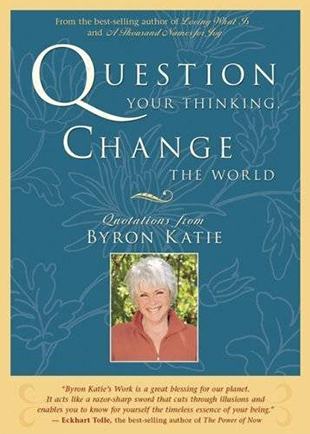Byron Katie is the author of the bestselling books Loving What Is: Four Questions That Can Change Your Life and A Thousand Names for Joy. She has introduced The Work to hundreds of thousands of people in corporations, universities, schools, prisons, hospitals, churches, and weekend intensives. This process of self-inquiry revolves around four questions: Is it true? Can you absolutely know that it's true? How do you react when you think that thought? Who would you be without that thought?
In this enlightening paperback, Katie has collected key quotations from her teachings and put them together in the following chapters:
• On Love, Sex, and Relationships
• On Health, Sickness, and Death
• On Parents and Children
• On Work and Money
• On Self-Realization
It is her view that we cause ourselves immense suffering, pain, and disappointment by the stories we tell ourselves, which often harden into beliefs:
"A thought is harmless unless we believe it. It's not our thoughts, but the attachment to our thoughts, that causes suffering. Attaching to a thought means believing that it's true, without inquiring. A belief is a thought that we've been attaching to, often for years."
Through the process of self-inquiry, we learn to question our beliefs and stressful thoughts. We are often quite astonished to discover that many of them are misunderstandings or just things we have taken for granted over the years. Questioning our mind is the key to entering the path of freedom.
For example, in the section on Work and Money, she gets our attention with this statement:
"What you want money for is to buy you happiness. This Work will give you happiness without money. And it becomes clear that money is not that important. So you become unattached to money, and then it can't help but find you. That's a law."
Katie discusses her responses to the idea that money keeps us safe, the obsession with wealth and poverty, the yearning for financial security, the fear of bankruptcy, and the challenge of abundance.
She is equally intriguing on work:
"The job you do out there in the apparent world is secondary. It's only a place for you to judge, inquire, and know yourself. Your true job is to appreciate what is; you primary profession is to be clear."
She also examines the thought that "I have to go to work," negative feelings about superiors, the meaning of success, and the fact that everyone is their own boss.
Here is a sampler of some other provocative quotations from the book:
• Your Partner Is Your Guru
"People go to India to find a guru, but you don't have to: you're living with one. Your partner will give you everything you need for your own freedom."
Love
"It's not your job to love me — it's mine."
Desires
"You are suffering from the belief that there's something missing from your life. In reality, you always have what you need."
Body
"When you believe your thoughts, you rape your body by saying that it should be more beautiful, it should be healthier, it should be taller, shorter, fatter, thinner, younger, stronger. You take a perfect body and trash it."
Self-Realization
"Self-realization is the sweetest thing. It shows us how we're fully responsible for ourselves, and that is where we find our freedom. Rather than being other-realized, you can be self-realized. Instead of looking to us for your fulfillment, you can find it in yourself."
